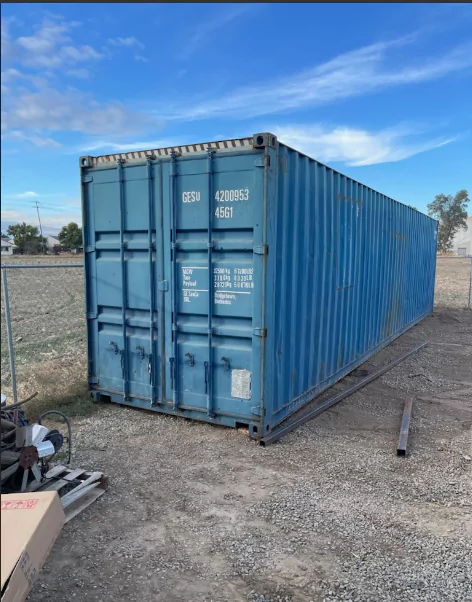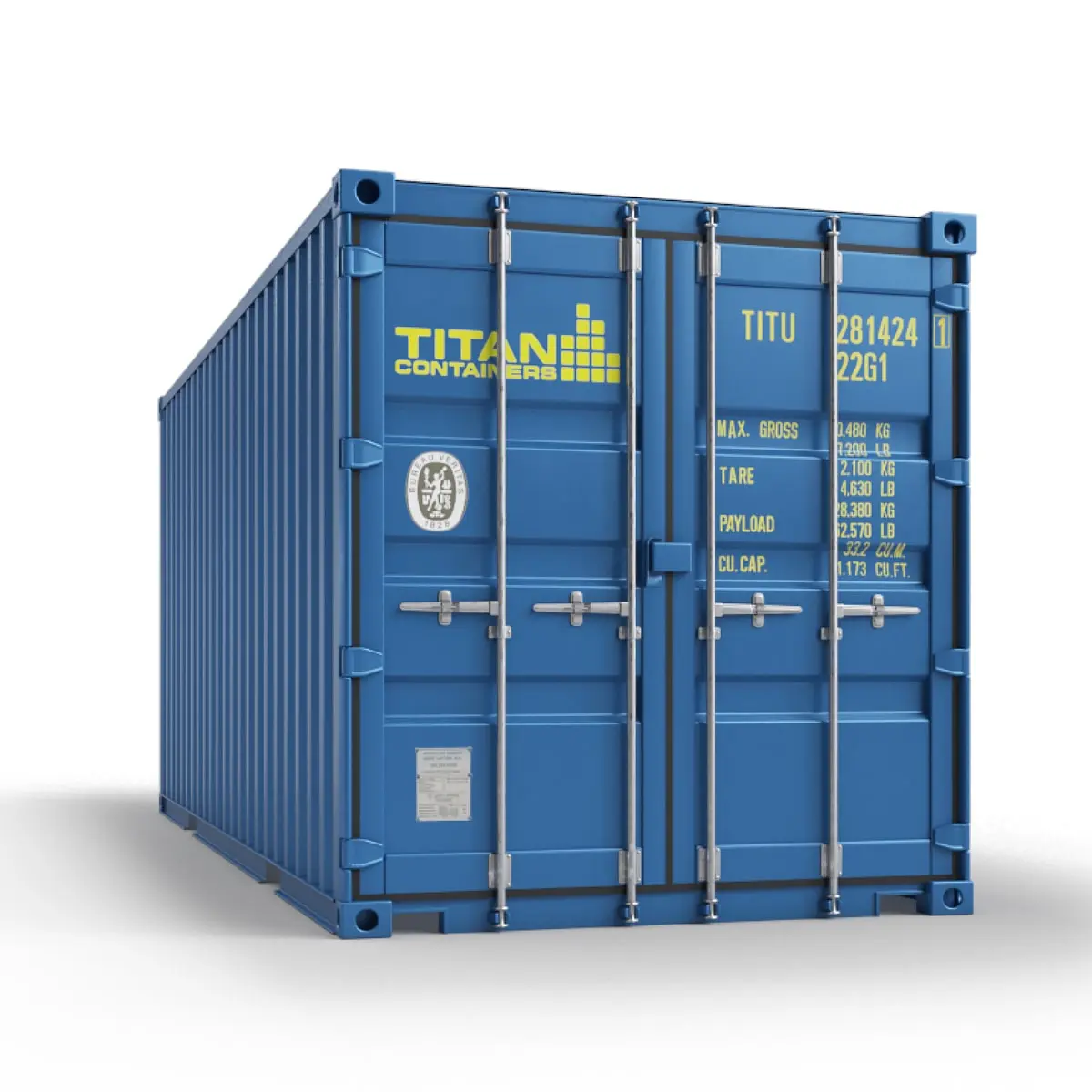Every little thing You Need to Find Out About Shipping Containers and Their Practical Applications
Shipping containers have actually progressed from plain tools for transportation to functional frameworks with numerous useful applications. Their durable layout and typical sizing make them perfect for an array of usages beyond delivery. From ingenious real estate solutions to lasting farming, their adaptability is significant. Yet, the opportunities do not end there. Discovering their numerous functions reveals unexpected insights into modern-day difficulties and creative remedies. What other roles could these containers play in today's globe?
The Design and Framework of Shipping Containers

Inside, containers are made to make the most of room, often featuring wooden or steel flooring that can support considerable weight. Air flow systems might be integrated to avoid wetness accumulation, which is vital for sensitive freight. Additionally, enhanced edges allow for very easy handling by cranes and forklifts, facilitating smooth loading and unloading. This thoughtful layout and structure add to the containers' flexibility throughout various delivery and storage applications.
Advantages of Using Shipping Containers
While numerous transportation techniques have their advantages, making use of delivery containers stands apart as a result of their unrivaled flexibility and performance. Shipping containers offer a standardized size, making them simple to stack and carry across numerous modes of transportation, including trains, vehicles, and ships. This standardization lowers loading and dumping times, therefore raising total performance.
Shipping containers are created from durable materials, offering durable defense for products throughout transit. They are weather-resistant and safe, minimizing the danger of damages from environmental aspects or theft. Additionally, the modular design of shipping containers permits very easy personalization, allowing companies to adapt them for different functions, such as storage or mobile offices.
Finally, their portability and cost-effectiveness make delivery containers an attractive choice for businesses aiming to improve logistics and supply chain procedures. These advantages add to the expanding appeal of delivery containers in various industries.
Innovative Housing Solutions With Shipping Containers
Cutting-edge housing solutions have become an amazing application of delivery containers, leveraging their inherent strengths for domestic usage. These functional structures provide a lasting choice to standard structure products, often at a portion of the expense. Designers and designers have actually changed containers into elegant, useful homes, satisfying varied way of lives and preferences.

Moreover, delivering containers are eco-friendly, promoting recycling and lowering waste. Several jobs concentrate on energy performance, incorporating environment-friendly roofings and solar panels. As urbanization increases, these innovative real estate remedies offer a practical action to real estate lacks while promoting a distinct architectural visual.
Shipping Containers in Retail and Pop-Up Shops
A growing variety of merchants are transforming to delivering containers as a dynamic remedy for retail spaces and pop-up stores. These versatile frameworks supply an affordable choice to conventional shops, allowing businesses to create distinct, appealing environments that bring in clients. Their modular style allows simple transportation and setup, making them ideal for short-term or seasonal retail areas.
Stores can customize shipping containers to reflect their brand name identification, changing them right into aesthetically appealing stores that stand out in congested markets. The portable nature of containers also motivates effective use room, permitting imaginative formats that maximize client circulation and engagement. Shipping containers can be positioned in unconventional areas, such as urban parks or uninhabited whole lots, boosting accessibility and foot website traffic.

As the retail landscape develops, shipping containers give a adaptable and cutting-edge option that satisfies the needs of modern-day consumers while boosting the purchasing experience.
Sustainable Farming Practices Utilizing Shipping Containers
Sustainable farming practices significantly incorporate shipping containers as cutting-edge options for agriculture - shipping container storage. These container ranches use hydroponics to optimize room and source efficiency, offering an economical strategy to food manufacturing. By changing shipping containers into agricultural centers, farmers can resolve food security and ecological issues concurrently
Container Farming Advantages
While conventional agriculture encounters obstacles read this article such as land scarcity and environment modification, container farming offers a sensible choice that maximizes room and resources. This cutting-edge method allows for year-round crop production in regulated settings, reducing reliance on weather condition conditions. Container ranches use much less water than standard farming, advertising sustainability and preservation. They can be developed in metropolitan locations, bringing fresh fruit and vegetables closer to customers and minimizing transport emissions. Furthermore, the modular nature of shipping containers allows scalability, permitting farmers to readjust procedures based on demand. Container farming likewise decreases chemical use by developing a confined ecosystem, eventually improving food safety and security. As city populations grow, container farming emerges as a useful service to meet the increasing need for local, sustainable food resources.
Hydroponics in Containers
Hydroponics, which permits plants to grow without dirt by using nutrient-rich water, grows within the confines of shipping containers, making it an optimal method for urban farming. These containers develop a regulated environment that maximizes humidity, temperature, and light, enabling year-round cultivation. With restricted room in metropolitan areas, shipping containers provide a scalable service for growing fresh produce. Hydroponic systems within containers can include different techniques, such as nutrient movie technique (NFT) and deep water culture (DWC), which maximize yield while decreasing water usage. This ingenious method not just enhances food security however additionally decreases the carbon impact related to conventional farming approaches. Consequently, hydroponics in containers useful source represents a forward-thinking service for sustainable city food manufacturing.
Cost-Effective Farming Solutions
As food manufacturing encounters enhancing difficulties as a result of climate change and urbanization, delivering containers become an affordable solution for agriculture. These functional structures can be repurposed for numerous lasting farming practices, such as hydroponics and upright farming. By making use of regulated environments within containers, farmers can enhance development cycles and minimize resource usage, consisting of water and fertilizers. Additionally, delivering containers can be strategically put in city locations, decreasing transport costs and boosting access to fresh fruit and vegetables. Their modular nature enables for scalability, making it possible for farmers to increase operations as demand grows. Repurposing containers contributes to waste decrease, lining up with environment-friendly agricultural initiatives. In general, delivering containers present ingenious opportunities for lasting and reliable food production.
Emergency and Catastrophe Relief Applications of Shipping Containers

Organizations frequently make use of delivery containers to create mobile facilities or area medical facilities, making sure that healthcare gets to those in requirement. Furthermore, they can be changed right into command centers for working with rescue operations, therefore enhancing organizational effectiveness throughout situations.
Containers can be modified to store vital goods such as food, apparel, and water, securing supplies until they are distributed. Their flexibility permits them to be quickly carried to different areas, guaranteeing that assistance arrives where it is most urgently needed. Generally, shipping containers play an essential function in enhancing the efficiency of calamity alleviation campaigns worldwide.
Regularly Asked Inquiries
Exactly How Are Shipping Containers Transported From One Area to Another?
Shipping containers are transported via ships, trains, and vehicles, using cranes for filling and discharging. This multi-modal transportation system guarantees reliable motion across land and sea, linking global supply chains and helping with worldwide trade.
What Is the Ordinary Lifespan of a Shipping Container?
The ordinary lifespan of a delivery container generally varies from 10 to 25 years, relying on maintenance, usage, and ecological elements. Appropriate care can prolong their functionality, while forget may lead to deterioration and damage.
Can Shipping Containers Be Modified for Various Usages?
Yes, shipping containers can be changed for various uses. They work as homes, offices, pop-up stores, and storage devices. Their versatility permits imaginative adjustments, making them ideal for a large range of applications.
Are Shipping Containers Eco Friendly?
Shipping containers can be environmentally friendly, as they promote repurposing and reusing. Their resilience reduces waste, while their usage in alternate housing and businesses reduces the requirement for brand-new products, contributing to sustainable techniques.
How Do I Pick the Right Size Shipping Container?
To pick the have a peek at this website ideal dimension delivery container, one need to assess storage needs, think about the desired use, and assess space schedule - Shipping Containers for Sale. Common dimensions include 20-foot and 40-foot containers, each serving various storage space and transportation requirements effectively
Ingenious housing services have actually arised as an exciting application of delivery containers, leveraging their integral staminas for household usage. The adaptability of delivery containers permits for innovative designs, from single-unit houses to complicated multi-container setups. Lasting farming techniques increasingly include shipping containers as ingenious options for farming. Additionally, the modular nature of shipping containers allows scalability, allowing farmers to adjust operations based on need. Hydroponics, which enables plants to grow without soil by utilizing nutrient-rich water, grows within the boundaries of delivery containers, making it a perfect method for city agriculture.